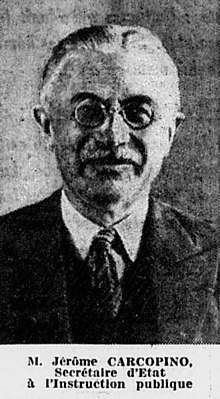Jérôme Carcopino
Jérôme Carcopino (27 June 1881 – 17 March 1970) was a French historian and author. He was the fifteenth member elected to occupy seat 3 of the Académie française, in 1955.

Biography
Carcopino was born at Verneuil-sur-Avre, Eure, son of a doctor from a Corsican family related to Bonaparte,[1] and educated at the École Normale Supérieure where he specialised in history. From 1904 to 1907 he was a member of the French School in Rome. In 1912 he was a professor of history in Le Havre. In 1912 he became a lecturer at the University of Algiers and inspector of antiquities in Algeria until 1920. His career was interrupted by World War I when he served in the Dardanelles. He became a professor at the Sorbonne in 1920 until 1937 when he became Director of the French School in Rome. From 25 February 1941 to 18 April 1942 he was the Minister of National Education and Youth in the government of Vichy France. He was a member of many archaeological and historical institutes in Europe.
Bibliography
- Jérôme Carcopino (1909). Histoire de l'ostracisme athénien.
- —— (1919). Virgile et les origines d'Ostie.
- —— (1919). La loi de Hiéron et les Romains.
- —— (1924). Points de vue sur l'ìmpérialisme romain.
- —— (1928). Autour des Gracques, études critiques.
- —— (1940). La vie Quotidienne à Rome à l’Apogée de l’Empire. (English: Daily Life in Ancient Rome: The People and the City at the Height of the Empire. Ed. Henry T. Rowell. Trans. Emily Overend Lorimer. Yale University Press. ISBN 0-300-00031-6.)
- —— (1951). Cicero: The Secrets of His Correspondence. Routledge & Kegan Paul Ltd.
- —— (1958). Passion et politique chez les Césars. Hachette.
- —— (1961). Les Etapes de l'impérialisme romain.
References
- Pouillon, François (2008). Dictionnaire des orientalistes de langue française. Karthala. p. 150.